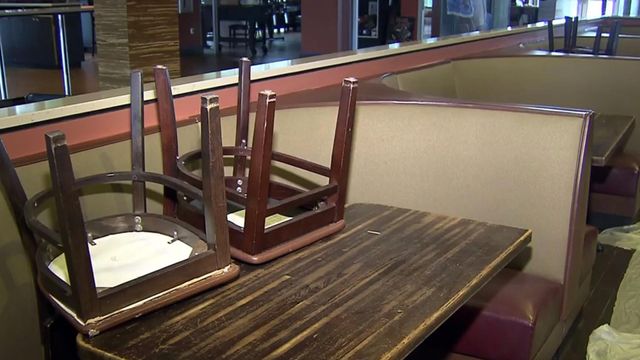Durham ready to block off city streets to help restaurants serve more people
Although most restaurants in North Carolina were allowed to reopen their dining rooms last week, Durham County took a tougher stance and kept local eateries closed. But that changes come Monday.
The city-county restrictions during the coronavirus pandemic ease to allow restaurants and personal care businesses like salons and barbershops to open at half capacity, as long as they also follow social distancing guidelines and adhere to strict sanitization protocols.
Durham Mayor Steve Schewel said city staff is working to help restaurant owners by blocking off some downtown streets so outdoor seating can be set up to allow the restaurants to increase their capacity and boost their bottom line.
"Our city staff is prepared to do whatever is necessary to make this happen," Schewel said, noting that state liquor regulations also need to be addressed.
"It’s very important for our restaurants downtown to get some revenue from selling alcohol," he said. "The ABC Commission has said that they can do so right outside of their restaurant, but they haven’t said if they can do that, for example, in a nearby park or parking lot."
State lawmakers passed legislation Thursday that would allow bars and restaurants to use outdoor seating to reopen and expand, respectively, during the pandemic. Gov. Roy Cooper has criticized the measure but hasn't said whether he will veto it.
Wendy Jacobs, chairwoman of the Durham County Board of Commissioners, said expanding outside is critical for the success of area restaurants. She said she hopes shopping centers will let tenants use parking spaces and sidewalks to set up tables.
"A lot of restaurants are constrained by their physical space. It’s going to be really difficult for them to economically sustain themselves if they cannot move outside," Jacobs said.
Rochelle Johnson, owner of Dashi restaurant in Durham, said the local support excites her.
"Outdoor dining might possibly be the only thing that is going to get downtown Durham restaurants a fighting chance at survival," Johnson said. "When we’re looking at takeout models or even possibly being able to seat inside with a 50 percent capacity, we really are only looking at possibly breaking even, if that."
Alex Amra, owner of Tobacco Road Sports Cafe, said he's just excited for the chance to welcome diners back after weeks of takeout and delivery orders.
"Any revenue is better than no revenue, even at 50 percent," Amra said. "We can try to make it work. Is it going to pay all the bills? No."
Tobacco Road, which sits beyond the left-field wall of the Durham Bulls Athletic Park, already planned to use its large patio area to help with its capacity and has revamped its interior.
"We’re going to keep all of our tables out to use them as barriers, but we’re going to seat anywhere from 6 to 8 feet apart," Amra said. "Everything that we can control, we’re going to do."
Some of the other changes include the following:
- Requiring all employees to wear masks
- Creating one-way traffic where people enter through the front of the restaurant and exit out the back near the stadium
- Banning people from sitting in the restaurant's row of recliners to wait for their table
- Using a combination of disposable menus and menus people can open on their smartphones by scanning a QR code
- Ditching salt and pepper shakers and condiment bottles in favor of single-use packets
Amra said he supports Durham's tougher restrictions, in part because he's a local business owner and not part of a national chain.
"I live here. My kids go to school here. My brothers, their kids go to school here. My sister. It behooves me to do all that I can. I’m affecting my neighbors, my friends, my family. So we have to be very, very vigilant," he said. "Let’s start stingy and slowly remove things. It’s much much easier to take away [restrictions] than it is to add."













